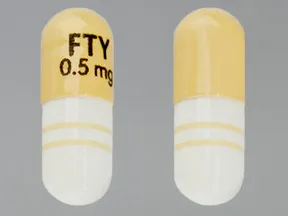Cough, headache, back pain, or diarrhea may occur. If any of these effects last or get worse, tell your doctor or pharmacist promptly.
Slow heartbeat may also occur, especially when you first start this medication. You will be monitored for at least 6 hours after the first dose to make sure your heartbeat does not go too slow. You may also need to be monitored if you restart this medication or after a dosage increase (in children). Ask your doctor for more details.
Remember that this medication has been prescribed because your doctor has judged that the benefit to you is greater than the risk of side effects. Many people using this medication do not have serious side effects.
This medication may raise your blood pressure. Check your blood pressure regularly and tell your doctor if the results are high.
Tell your doctor right away if you have any serious side effects, including: signs of liver disease (such as nausea/vomiting that doesn't stop, loss of appetite, stomach/abdominal pain, yellowing eyes/skin, dark urine), shortness of breath, unusual tiredness.
Fingolimod may increase the risk of skin cancer and lymphoma. Tell your doctor right away if you notice any new or changing skin growths/moles, or swollen lymph nodes.
This medication can weaken your immune system/increase the risk of infection while you are taking it and for 2 months after your last dose. You may be more likely to get a serious (possibly fatal) infection (such as bronchitis, pneumonia, herpes). Tell your doctor right away if you develop any signs of infection (such as cough/sore throat that doesn't go away, fever/chills, cold/flu symptoms, sores, or blisters). Do not start fingolimod if you already have an infection.
This medication may increase your risk of getting a rare but very serious (possibly fatal) brain infection (progressive multifocal leukoencephalopathy-PML). Symptoms of PML can seem like a worsening MS attack. Get medical help right away if you have any of these side effects: clumsiness, loss of coordination/balance, weakness, sudden change in your thinking (such as confusion, difficulty concentrating, memory loss), difficulty talking/walking, seizure.
Get medical help right away if you have any very serious side effects, including: very slow heartbeat, fast/irregular heartbeat, severe dizziness, fainting, chest pain, eye pain/sensitivity to light, vision changes (such as blurred vision, blind spot/shadows in the center of your vision, color changes), sudden/severe headache.
A very serious allergic reaction to this drug is rare. However, get medical help right away if you notice any symptoms of a serious allergic reaction, including: rash, itching/swelling (especially of the face/tongue/throat), severe dizziness, trouble breathing.
This is not a complete list of possible side effects. If you notice other effects not listed above, contact your doctor or pharmacist.
In the US - Call your doctor for medical advice about side effects. You may report side effects to FDA at 1-800-FDA-1088 or at www.fda.gov/medwatch.
In Canada - Call your doctor for medical advice about side effects. You may report side effects to Health Canada at 1-866-234-2345.
